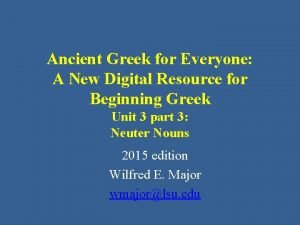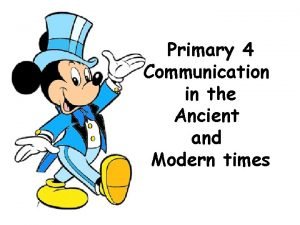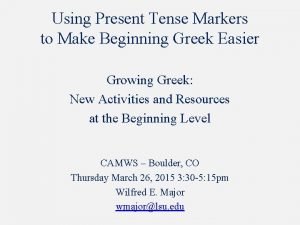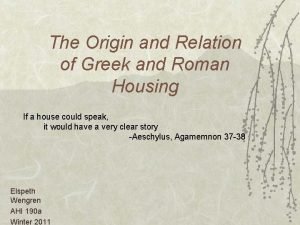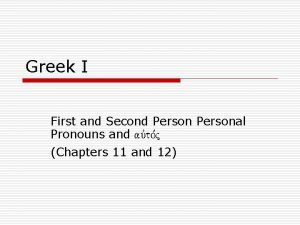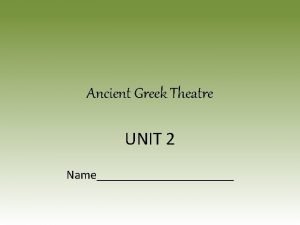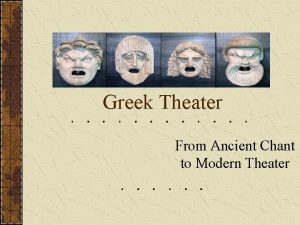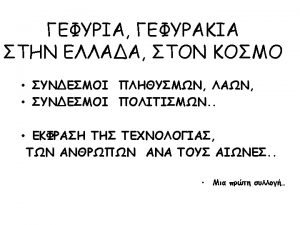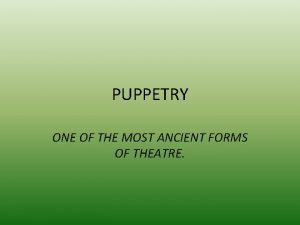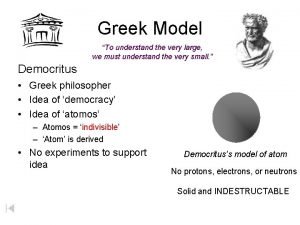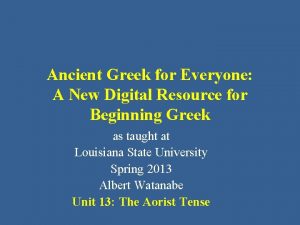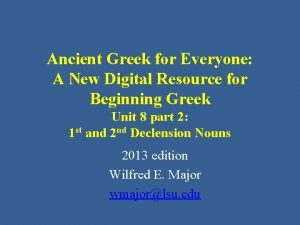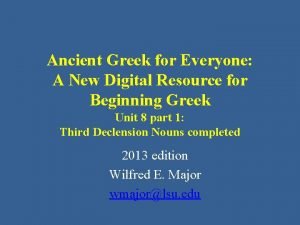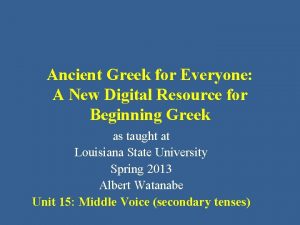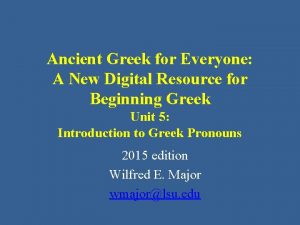Ancient Greek for Everyone A New Digital Resource











































- Slides: 43

Ancient Greek for Everyone: A New Digital Resource for Beginning Greek Unit 2 part 1: Introduction to the Greek Verb 2013 edition Wilfred E. Major wmajor@lsu. edu

Ancient Greek for Everyone This class AGE Unit 2: Introduction to the Greek Verb • You have learned the Greek alphabet and other components of the Greek writing system. • Now you begin learning Greek words: what they mean, how to form them, and how to understand them. • We begin with the most powerful category of Greek words, the part of speech called the VERB.

Ancient Greek for Everyone • A VERB describes an action. • An English verb by itself designates only the action that is taking place: run, stop, be, … • A Greek verb, however, normally communicates more information than just what the action is. • In fact, a Greek verb by itself usually communicates FIVE pieces of information:

Ancient Greek for Everyone • A Greek verb by itself usually communicates FIVE pieces of information: – – – Person Number Tense Mood Voice

Ancient Greek for Everyone • A Greek verb by itself usually communicates FIVE pieces of information: – Person: The subject of the verb, that is, who is the focus of the action – 1 st person = the speaker (I, we) – 2 nd person = person spoken to (you, y’all) – 3 rd person = anyone/anything else (he/she/it, they, or anyone/anything else you can name) – English uses separate words to indicate the person (subject).

Ancient Greek for Everyone • A Greek verb by itself usually communicates FIVE pieces of information: – Person – Number: whether the Person (subject) is singular or plural – singular = I, you, he/she/it, or any single subject – plural = we, y’all, they, or any plural subject – Tense – Mood – Voice

Ancient Greek for Everyone • A Greek verb by itself usually communicates FIVE pieces of information: – Person – Number: whether the person (subject) is singular or plural – English uses separate words to indicate the number of the person (subject) and marks a verb with a 3 rd person singular subject: runs, stops, is… – Tense – Mood – Voice

Ancient Greek for Everyone • A Greek verb by itself usually communicates FIVE pieces of information: – Person – Number – Tense: When the action happens (past, present, future) – Mood – Voice

Ancient Greek for Everyone • Tense: When the action happens (past, present, future) • English uses a combination of verb changes or additions and additional words to indicate the tense: – run, ran, have run, will run, do run, is running… – stop, stopped, have stopped, will stop, do stop, is stopping… – is, was, have been, is being…

Ancient Greek for Everyone • A Greek verb by itself usually communicates FIVE pieces of information: – – Person Number Tense Mood: This refers to the “mode” of the verb (most often indicating whether an action is real or hypothetical in some way). – Voice

Ancient Greek for Everyone • Mood: This refers to the “mode” of the verb (most often indicating whether an action is real or hypothetical in some way). • English uses additional words to indicate the mood: – to run, could run, might run, should run, would run… – to stop, could stop, might stop, should stop, would stop… – to be, could be, might be, should be, would be…

Ancient Greek for Everyone • A Greek verb by itself usually communicates FIVE pieces of information: – Person – Number – Tense – Mood: This refers to the “mode” of the verb (most often indicating whether an action is real or hypothetical in some way). – Indicative means the action is real. – Infinitive means the action without any time or subject. – Voice

Ancient Greek for Everyone • A Greek verb by itself usually communicates FIVE pieces of information: – – – Person Number Tense Mood Voice: This indicates the role the subject plays in the action.

Ancient Greek for Everyone • A Greek verb by itself usually communicates FIVE pieces of information: – Voice: This indicates the role the subject plays in the action. – Greek can distinguish three roles (voices): – Active: The subject causes the action • We run the program. • We stop the program. • I buy a drink.

Ancient Greek for Everyone • A Greek verb by itself usually communicates FIVE pieces of information: – Voice: This indicates the role the subject plays in the action. – Greek can distinguish three roles (voices): – Middle: The subject is part or all of the action • We run. • We stop. • I buy (myself) a drink.

Ancient Greek for Everyone • A Greek verb by itself usually communicates FIVE pieces of information: – Voice: This indicates the role the subject plays in the action. – Greek can distinguish three roles (voices): – Passive: The subject receives the consequence of the action • We are run by a computer. • We are stopped by a police officer. • The drinks are bought by me. – Note: In Classical Greek, the passive voice is rare, but it becomes more common in Koine Greek.

Ancient Greek for Everyone • A Greek verb by itself usually communicates FIVE pieces of information: – Person – Number – Tense – Mood – Voice PARSING: To “parse” a Greek verb means to identify the above five qualities about a specific verb form.

Ancient Greek for Everyone • PARSING: To “parse” a Greek verb means to identify the five qualities about a specific verb form. • For example, a specific verb form could be – Third person – Singular – Present – Indicative – Active • Once you know these five items and the verb’s meaning, you have identified the verb completely and understand what it means.

Ancient Greek for Everyone AGE Unit 2: Introduction to the Greek Verb • Now you have learned the what information a Greek verb conveys about an action. • Next we learn how a Greek verb conveys this information. • You have seen how English verbs change, make additions or use additional words to convey information.

Ancient Greek for Everyone • I am running. • You are running. • She is running. • We are running. • Y’all are running. • They are running. Building a Greek Verb Consider the verbs in the above sentences

Ancient Greek for Everyone • runningi • runningyou • runningshe • runningwe • runningy’all • runningthey Building a Greek Verb Now IMAGINE verbs like this!

Ancient Greek for Everyone • I do stop. • You do stop. • He does stop. • We do stop. • Y’all do stop. • They do stop. Building a Greek Verb Consider the verbs in the above sentences

Ancient Greek for Everyone • stopdoi • stopdoyou • stopdohe • stopdowe • stopdoy’all • stopdothey Building a Greek Verb Now IMAGINE verbs like this!

Ancient Greek for Everyone Building a Greek verb • Those imaginary verbs work basically the way verbs work in Greek. • Greek verbs for the most part communicate person, number, tense, mood and voice by adding parts to the verb, rather than by using additional words. • Building verbs this way can seem strange at first, but to a Greek, piling on words they way English does seems strange. Neither is better or more difficult, but they are different.

Ancient Greek for Everyone Building a Greek verb • To begin building a Greek verb, start with the “stem. ” • The stem tells you what action the verb describes: δεικ = “show”

Ancient Greek for Everyone Building a Greek verb • All the verbs in this unit are in the present tense. • So the stem needs a marker that says the verb is in the present tense. • Adding a -ν- to the stem typically marks a verb as in the present tense. It will be easier to pronounce this verb by adding –νυ–. • So now the stem looks (and sounds) like this: – δεικνυ = “show” (in the present)

Ancient Greek for Everyone Building a Greek verb • So now the verb is in the present tense. • The most common mood of Greek verbs is the indicative (which means the action is real). This is also effectively the default mood for verbs. • All the verbs in this unit are in the active voice, so the following verb forms are – Present tense – Indicative mood – Active voice

Ancient Greek for Everyone Building a Greek verb • To indicate person and number, the verb needs distinct endings, which are as follows: • -μι = I (1 st person singular) -μεν = we (1 st person plural) • -ς = you (2 nd person singular) -τε = y’all (2 nd person plural) • -σι = (s)he, it (3 rd person sing) -ασι = they (3 rd person plural)

Ancient Greek for Everyone • δείκνυμι – I show, am showing, do show. • δείκνυς • δείκνυμεν – We show, are showing, do show. • δείκνυτε – You show, are showing, do show. • δείκνυσι – (S)he/it shows, is showing, does show. – Y’all show, are showing, do show. • δεικνύασι – They show, are showing, do show. Building a Greek Verb The Present Indicative Active of δείκνυμι

Ancient Greek for Everyone • From Unit 1: Placing the accent: – On most Greek words, the “recessive” rule determines the placement of the accent. This means: – If the last syllable of the word contains a single short vowel, the accent “recedes” two syllables: – δίδοτε – It can recede only to the last short vowel sound of this syllable (never to the first part), so the accent appears as an acute (“/”): – ἄνθρωπος, δώσετε (= δοόσετε)

Ancient Greek for Everyone • From Unit 1: Placing the accent: – On most Greek words, the “recessive” rule determines the placement of the accent. This means: – If the word has only two syllables and the last syllable of the word contains a single short vowel, the accent “recedes” to the first syllable: – δότε – or the first part of a long vowel sound: – δῶρον (= δόορον)

Ancient Greek for Everyone • From Unit 1: Placing the accent: – On most Greek words, the “recessive” rule determines the placement of the accent. This means: – If the last syllable of the word contains a long vowel sound, the accent “recedes” only one syllable: – διδότω. – It can recede only to the second part of this syllable, so the accent always appears as an acute (“/”): – παραδώσω (= παραδοόσω = παραδοόσοο)

Ancient Greek for Everyone Spell it Like It Sounds! • Remember: A word ending in -σι can add a final -ν (“nu -movable”) to make pronunciation easier: – For example, εἴκοσι εἶσι εἴκοσιν εἶσιν. – This added -ν has no meaning; it simply helps pronunciation. – For the verb δείκνυμι, this means δείκνυσι and δεικνύασι can appear as δείκνυσιν and δεικνύασιν. It does not affect their parsing, meaning or translation.

Ancient Greek for Everyone • The second most common mood of Greek verbs is the infinitive (which refers to the action without person, number or tense, so it needs only a single ending). • The ending –ναι signals the verb is in the infinitive. • δεικνύναι – “show” in the infinitive mood (mode) • This form is the present, infinitive, active. • Note the placement of the accent. • We will learn the meanings and translations of the infinitive mood while reading passages.

Ancient Greek for Everyone • A Greek verb by itself usually communicates FIVE pieces of information: – Person – Number – Tense – Mood – Voice PARSING: To “parse” a Greek verb means to identify the above five qualities about a specific verb form.

Ancient Greek for Everyone • PARSING: To “parse” a Greek verb means to identify the above five qualities about a specific verb form. • For example, δείκνυμι is – First person – Singular – Present – Indicative – Active • All of the above information, plus its stem meaning, tells you that this form means “I show, ” or “I am showing” or “I do show. ”

Ancient Greek for Everyone • When translating a Greek verb into English, – Do not worry about using two, three or more words in English to translate just one in Greek. The two languages build their words differently. – Try to see the action that the Greek verb describes. Then use the English that describes that same action. – Sometimes you have multiple ways to translate a verb. Choose the way that works best in English. – For example, δείκνυμι (first person, singular, present, indicative, active) legitimately translates as “I show, ” or “I am showing” or “I do show. ” Choose the one that works best in English.

Ancient Greek for Everyone • VOCABULARY: Although a Greek verb can morph into many different forms, it is listed in a dictionary (Greek “lexicon”) under just one form: – First person – Singular – Present – Indicative – Active • For example: δείκνυμι show

Ancient Greek for Everyone Examples of Vocabulary entries • ἀπόλλυμι kill, destroy • δείκνυμι show • μίγνυμι mix

Ancient Greek for Everyone • μίγνυμι • μίγνυμεν – I mix, am mixing, do mix. • μίγνυς – You mix, are mixing, do mix. • μίγνυσι – (S)he/it mixes, is mixing, does mix. – We mix, are mixing, do mix. • μίγνυτε – Y’all mix, are mixing, do mix. • μιγνύασι – They mix, are mixing, do mix. Building a Greek Verb The Present Infinitive Active is μιγνύναι

Ancient Greek for Everyone Building a Greek verb • The stem of ἀπόλλυμι is: – ολ = “kill, destroy” – ολνυ ολλυ = “kill, die” (in the present) • The combination –λν– always changes to –λλ– in Greek. • In practice, Greek always adds a prefix to this word, ἀπ(ό), meaning “away, ” similar to the way English can say “kill off. ” Thus the stem actually looks (and sounds) like this: – ἀπολλυ = “kill, destroy” (in the present) – This verb is rare except in this compounded form.

Ancient Greek for Everyone • ἀπόλλυμι – I kill, am killing, do kill. • ἀπόλλυς – You kill, are killing, do kill. • ἀπόλλυσι – (S)he/it kills, is killing, does kill. • ἀπόλλυμεν – We kill, are killing, do kill. • ἀπόλλυτε – Y’all kill, are killing, do kill. • ἀπολλύασι – They kill, are killing, do kill. Building a Greek Verb The Present Infinitive Active is ἀπολλύναι

Ancient Greek for Everyone • Next – practice with ἀπόλλυμι, δείκνυμι, μίγνυμι • The practice sheet provides all the forms of these three verbs. We will draw forms at random from a hat, and you need to (1) say the word out loud (2) parse the form and (3) translate it into English. – start AGE Unit 2 part 2: Six Common Greek verbs.
 ἀμφί
ἀμφί Ancient greek for everyone
Ancient greek for everyone Good afternoon everyone,
Good afternoon everyone, Offentlig förvaltning
Offentlig förvaltning Greek for everyone
Greek for everyone Resource leveling is the approach to even out the peaks of
Resource leveling is the approach to even out the peaks of Perbedaan resource loading dan resource leveling
Perbedaan resource loading dan resource leveling Everyone dancing merrily in the new old fashioned way
Everyone dancing merrily in the new old fashioned way New deal everyone
New deal everyone Communication in ancient time
Communication in ancient time Ancient india vs ancient china
Ancient india vs ancient china Ancient greek imperative
Ancient greek imperative Pastas prostas
Pastas prostas English-georgian period floral design
English-georgian period floral design Theatron greek theatre definition
Theatron greek theatre definition Art nouveau period floral design
Art nouveau period floral design How to make greek masks
How to make greek masks Greek subject pronouns
Greek subject pronouns Ancient greek flags
Ancient greek flags Ancient greece map
Ancient greece map Greek theater costumes
Greek theater costumes Theatre masks name
Theatre masks name Classic greek instrument
Classic greek instrument Periaktoi
Periaktoi Greek culture values
Greek culture values Greece geography map
Greece geography map Ancient greek language
Ancient greek language Ancient greek olympics primary sources
Ancient greek olympics primary sources Ancient greek theater masks
Ancient greek theater masks Ancient greek masks
Ancient greek masks Ancient greek theater
Ancient greek theater Chaos greek god family tree
Chaos greek god family tree Ancient greek theater masks
Ancient greek theater masks Ancient greek conjunctions
Ancient greek conjunctions Ancient greek bridge
Ancient greek bridge Greek theatre skene
Greek theatre skene Ancient greek chemistry
Ancient greek chemistry Lexilogos ancient greek
Lexilogos ancient greek Ancient greek theatre architecture
Ancient greek theatre architecture The zappian
The zappian Sophisticated form of puppetry
Sophisticated form of puppetry Physical education in greece ppt
Physical education in greece ppt Ancient greek model of the atom
Ancient greek model of the atom Culture or way of living station 1
Culture or way of living station 1

